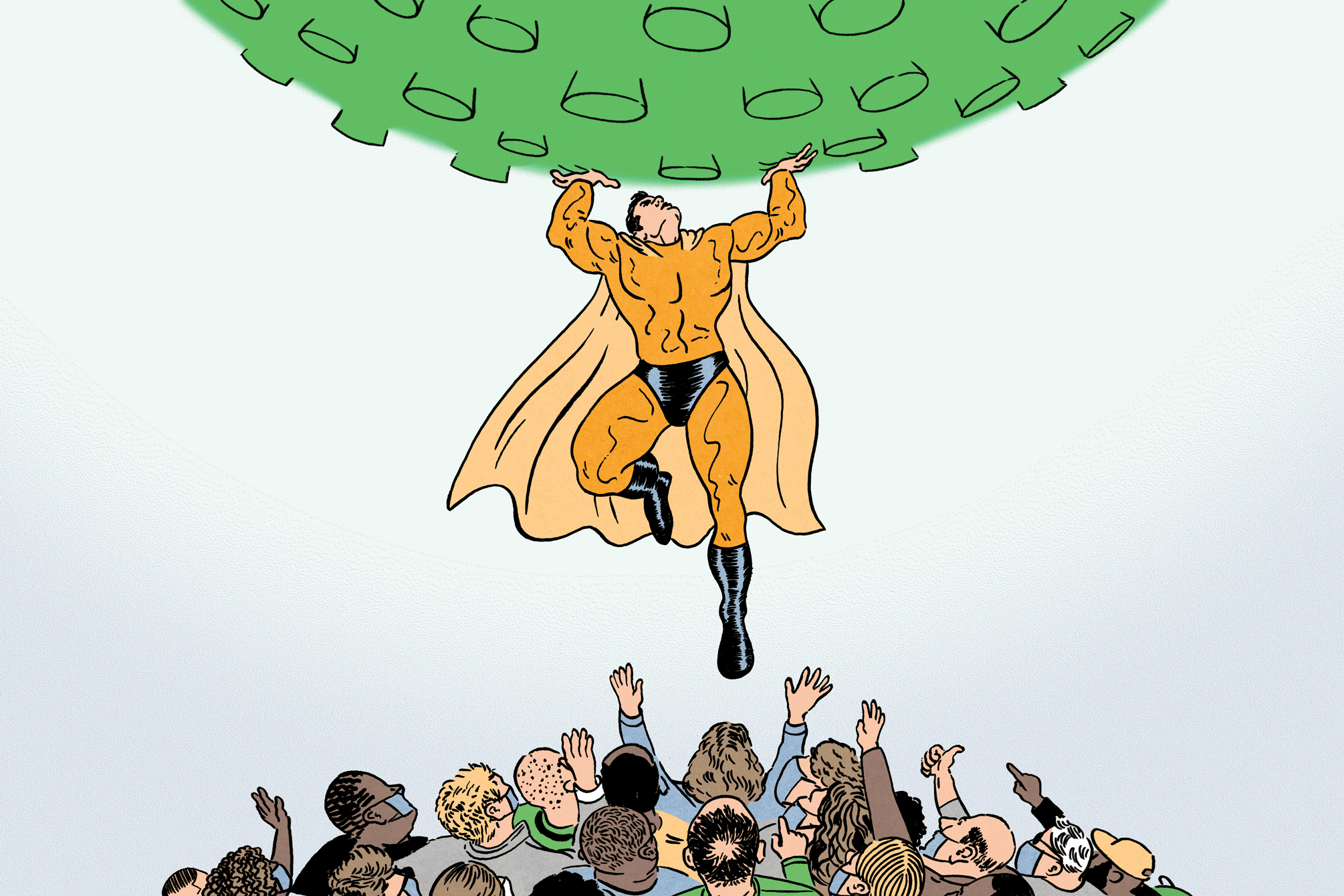TV in the time of COVID-19: Why we flock to stories of pandemics and other disasters

- Share via
When “Brockmire” creator Joel Church-Cooper decided to push his IFC satire about a disgraced sports announcer 10 years into the future for its fourth and final season, which began airing in March, star Hank Azaria had doubts.
“I was a little skeptical of going there,” says Azaria. “He was imagining where we might end up as a society
— and it included a pandemic.” Specifically, a Lassa fever epidemic with such a high body count that people can’t be buried: They’re being burned. (Also, temps on the East Coast are a balmy 115 degrees and the Southwest has collapsed into Disputed Lands.)
Adds Azaria, “Who knew that it wasn’t 10 years away — it was 10 minutes away?”
Long before COVID-19 changed the course of our daily lives, TV writers had spent countless hours finding ways to entertain audiences with dystopias, apocalypses and disasters. And while indulging in end-of-the-world (or change-of-world) scenarios might seem tasteless in the middle of a real-life pandemic, audiences actually began flocking to these topics as the novel coronavirus took hold: In late March, Netflix’s top titles included films like “Contagion” and TV series like “Containment.”
Exactly why we turn to disaster while in the midst of one can be both complicated and simple. Tim Minear, who staged a tsunami that wiped out Santa Monica on Fox’s “9-1-1” last fall, suggests it’s part of our deep psychology. “There’s something Jungian about a destroyed landscape where nothing’s left,” he says. “It resonates in the collective unconscious.”
For Graeme Manson, showrunner for the new TNT series “Snowpiercer,” which takes place on Earth after a climate change disaster has turned it into a frozen wasteland, says it’s much simpler than that. “Postapocalyptic problems come with heroes who have solutions,” he says. “It’s a mix of fatalism and optimism we all have.”
But pandemics on TV are trickier business, even when they aren’t reflecting reality. While the three “Chicago” franchise shows on NBC (“Med,” “Fire” and “P.D.”) aired a block of intertwined stories last year focusing on an outbreak, the network pulled a “New Amsterdam” episode about a flu epidemic in April. And as Minear recalls, “9-1-1: Lone Star” nearly ended its season with a pandemic episode in March — but the writers went with a solar storm instead. Why?
“As [star] Rob Lowe noted, pandemics aren’t super-fun television,” Minear says. “You can’t see the stars — because you put them in space suits.”
“Designated Survivor” showrunner Neal Baer might disagree with that; his show focused on a lab-engineered virus during Season 3 last year and says that a pandemic with a new virus is actually riveting TV. “COVID is unfolding like a detective story, and we sit waiting for the next evidence,” he says. “Uncertainty breeds panic — but it’s also a great device for television and movies and keeps us on the edge of our seat.”
Baer, a pediatrician by training before he became a showrunner, says 1,200 children die every day from malaria — which has a known treatment and could potentially be ended with DNA sequencing CRISPR technology — but because there’s a treatment, “It doesn’t captivate us. My point is that when the uncertainty becomes certainty, reality isn’t as captivating. That’s the case for TV. But on TV, we can provide catharsis and resolution.”
And during a terrifying real-life period where governmental response is muddled at best and solutions are distant, watching world-ending problems that highlight heroism and solutions can feel like comfort food.
Still, “Handmaid’s Tale” (Hulu) showrunner Bruce Miller says that these “solutions” peddled on TV are sheer fiction, as we’re seeing during the coronavirus pandemic. “People are sold a bill of goods about [what a disaster] would be like,” he says. “You think, ‘It’ll be me who saves the world — or someone else.’ But really, it’s a cooperative effort. That’s not the version you see on television. What we’re learning here and now is that it’s a lot of normal people doing small, extraordinary things.”
Which may indicate changes in TV disaster/apocalyptic storytelling, at least if writers are hoping for verisimilitude.
“I’m thinking of what stories in a post-corona world will be like,” says Howard Overman, executive producer on “War of the Worlds” (Epix). “How are we going to redefine community? Will this pull us apart or pull us together?”
“I’m constantly looking at the media response,” says “Snowpiercer’s” Manson. “It’s shocking and galvanizing. People are so ridiculously political in our crises. This pandemic has shown the divisions in our playing fields.”
Whatever real-world scenarios writers end up using as future fodder, though, trust that disaster stories are not about to go extinct. “There’s catharsis in a disaster that can be solved in 12 minutes, or 50 minutes, or two episodes,” says Minear. “And there’s always something inspiring about seeing heroes be heroic. That’s why Superman is still around.”
More to Read
The complete guide to home viewing
Get Screen Gab for everything about the TV shows and streaming movies everyone’s talking about.
You may occasionally receive promotional content from the Los Angeles Times.






